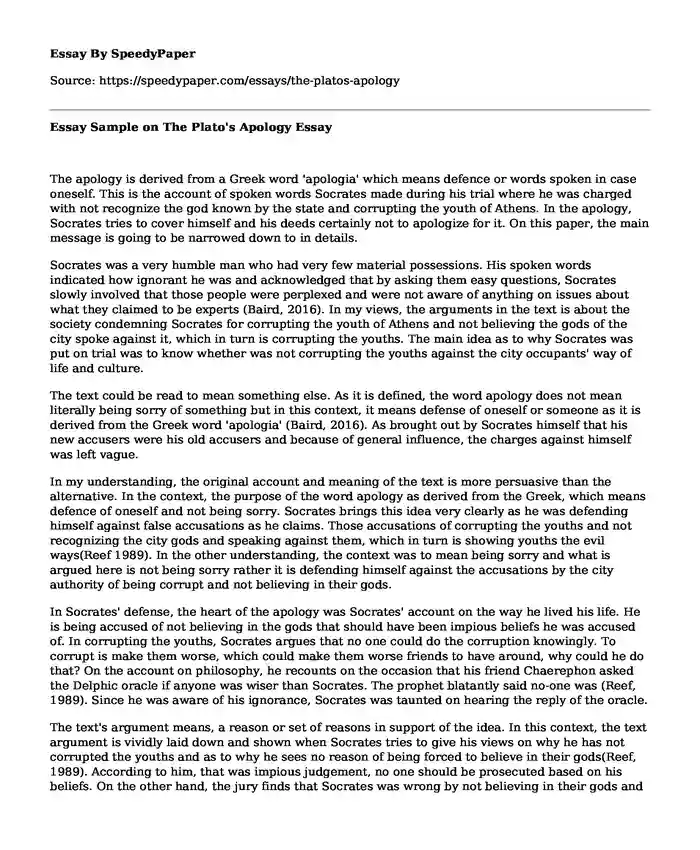
| Type of paper: | Argumentative essay |
| Categories: | Religion Democracy Plato |
| Pages: | 3 |
| Wordcount: | 780 words |
The apology is derived from a Greek word 'apologia' which means defence or words spoken in case oneself. This is the account of spoken words Socrates made during his trial where he was charged with not recognize the god known by the state and corrupting the youth of Athens. In the apology, Socrates tries to cover himself and his deeds certainly not to apologize for it. On this paper, the main message is going to be narrowed down to in details.
Socrates was a very humble man who had very few material possessions. His spoken words indicated how ignorant he was and acknowledged that by asking them easy questions, Socrates slowly involved that those people were perplexed and were not aware of anything on issues about what they claimed to be experts (Baird, 2016). In my views, the arguments in the text is about the society condemning Socrates for corrupting the youth of Athens and not believing the gods of the city spoke against it, which in turn is corrupting the youths. The main idea as to why Socrates was put on trial was to know whether was not corrupting the youths against the city occupants' way of life and culture.
The text could be read to mean something else. As it is defined, the word apology does not mean literally being sorry of something but in this context, it means defense of oneself or someone as it is derived from the Greek word 'apologia' (Baird, 2016). As brought out by Socrates himself that his new accusers were his old accusers and because of general influence, the charges against himself was left vague.
In my understanding, the original account and meaning of the text is more persuasive than the alternative. In the context, the purpose of the word apology as derived from the Greek, which means defence of oneself and not being sorry. Socrates brings this idea very clearly as he was defending himself against false accusations as he claims. Those accusations of corrupting the youths and not recognizing the city gods and speaking against them, which in turn is showing youths the evil ways(Reef 1989). In the other understanding, the context was to mean being sorry and what is argued here is not being sorry rather it is defending himself against the accusations by the city authority of being corrupt and not believing in their gods.
In Socrates' defense, the heart of the apology was Socrates' account on the way he lived his life. He is being accused of not believing in the gods that should have been impious beliefs he was accused of. In corrupting the youths, Socrates argues that no one could do the corruption knowingly. To corrupt is make them worse, which could make them worse friends to have around, why could he do that? On the account on philosophy, he recounts on the occasion that his friend Chaerephon asked the Delphic oracle if anyone was wiser than Socrates. The prophet blatantly said no-one was (Reef, 1989). Since he was aware of his ignorance, Socrates was taunted on hearing the reply of the oracle.
The text's argument means, a reason or set of reasons in support of the idea. In this context, the text argument is vividly laid down and shown when Socrates tries to give his views on why he has not corrupted the youths and as to why he sees no reason of being forced to believe in their gods(Reef, 1989). According to him, that was impious judgement, no one should be prosecuted based on his beliefs. On the other hand, the jury finds that Socrates was wrong by not believing in their gods and as well as corrupting the youths to follow him.
In conclusion, the Plato's the apology is the account of the speech of Socrates on the eve of his trial in which he was prosecuted with not believing in the gods which was recognized by the state. Throughout the trial period, Socrates spoke his mind and claimed that he was not conversant with the law, and thus, he would talk in the manner he was accustomed to. In my view, Socrates was fighting for democracy and hypocrisy in their state. This is well illustrated when he was accused of conspiring not to follow the authority. During his trial, the accusers in their hypocrisy proposed death, knowing that Socrates would choose for exile. Instead, he as well tells them that that was his preference. Though they knew that Socrates was the best philosopher, they did not want to accept that until the leaders from the Delphic oracle came to tell how wise he was.
References
Baird, F. (2016). Philosophic classics: from Plato to Derrida. Routledge.
Cite this page
Essay Sample on The Plato's Apology. (2023, Feb 10). Retrieved from https://speedypaper.com/essays/the-platos-apology
Request Removal
If you are the original author of this essay and no longer wish to have it published on the SpeedyPaper website, please click below to request its removal:
- Essay Sample: Psychological Report for the Boy with Intellectual Disability
- Free Essay on Philosophy Questions
- Freeway 280 - Poem Analysis Essay Sample
- Political Philosophies - An Essay Sample for Everyone
- Free Essay with the Contract Bargaining Case Study
- Paper Example: A Trade Deficit
- Free Essay: The Church Before Constantine
Popular categories




